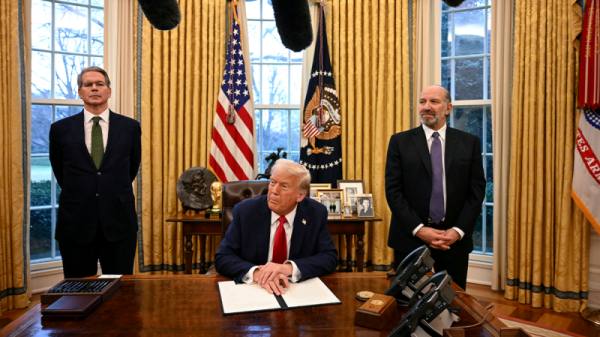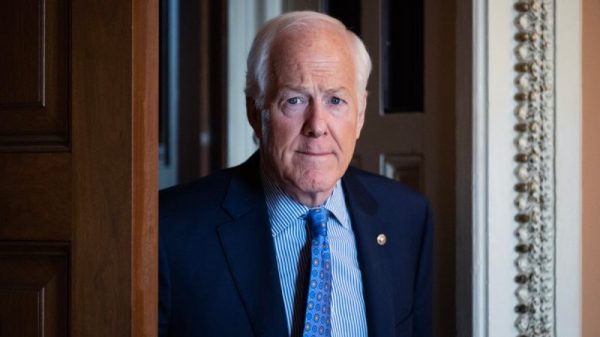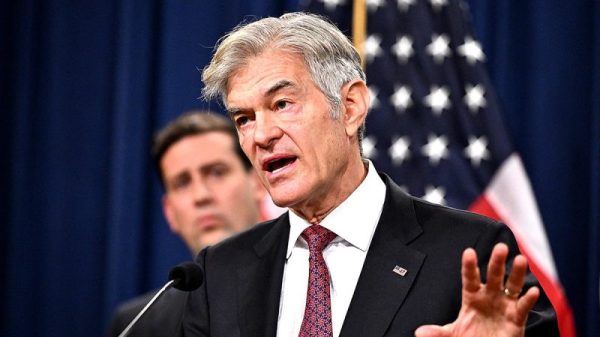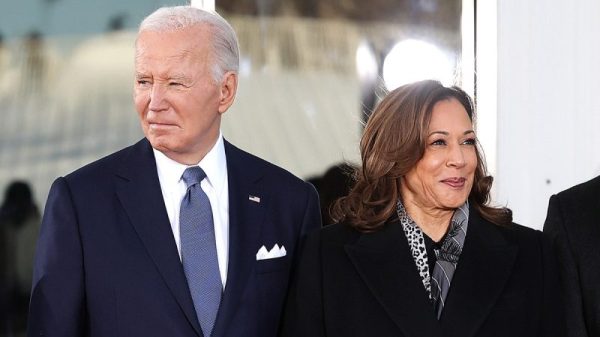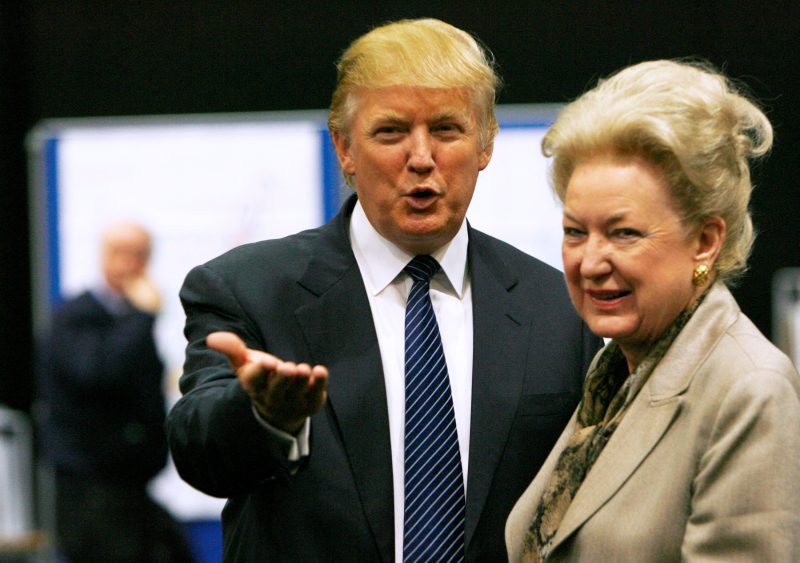Maryanne Trump Barry, Donald Trump’s older sister and a former federal judge in New Jersey who was surreptitiously recorded by a family member criticizing her brother’s presidency, saying he was “cruel” and “has no principles,” was found dead Nov. 13 at her home on Manhattan’s Upper East Side. She was 86.
Her death was confirmed by a law enforcement official and a person close to the Trump family speaking on the condition of anonymity to discuss private matters. No other information was immediately provided.
Mrs. Barry and her real estate mogul brother were not known to be particularly close, and she made only rare visible ventures into his exceedingly public life. Her brother’s presidency, during which he made racist statements and villainized immigrants, strained their relationship further. She became a withering — though private — critic of her brother.
In 2018 and 2019, Mrs. Barry’s niece, Mary L. Trump, secretly recorded 15 hours of face-to-face conversations with her, releasing audio excerpts and transcripts to The Washington Post in 2020 after the publication that year of her best-selling book “Too Much and Never Enough: How My Family Created the World’s Most Dangerous Man.”
“It’s the phoniness of it all,” Mrs. Barry told her niece. “It’s the phoniness and this cruelty. Donald is cruel.”
“All he wants to do is appeal to his base,” Mrs. Barry continued to her niece. “He has no principles. None. None. And his base, I mean my God, if you were a religious person, you want to help people. Not do this.”
Her brother refused to concede his defeat in the 2020 presidential election and has been charged in federal and state courts for his alleged efforts in trying to overturn Joe Biden’s victory. Trump remains the front-runner for the Republican presidential nomination in 2024.
Mrs. Barry, the eldest of Fred and Mary Trump’s five children, was never a contender to take over the family’s real estate empire. She went her own way, into a legal and judicial career.
Over the years, Mrs. Barry confirmed her brother’s well-documented egotism, telling Trump biographer Gwenda Blair that Donald “likes hearing about how he’s the greatest — not just the greatest, but the best of the greatest.”
But when he got into trouble, she sometimes came to the defense of her kid brother.
In 2008, when Donald was trying to save his Scotland golf course and resort project from intense opposition by neighbors who were appalled by the scope of his coastal development plan, he staged a highly publicized visit to his immigrant mother’s hometown — his first time there since he was a toddler.
As part of the family’s successful PR blitz to save their project, Mrs. Barry attended a news conference near a Scottish castle and spoke about how their mother “would be so proud to see Donald here today.”
Maryanne Elizabeth Trump was born in Queens on April 5, 1937, and was raised under the strict watch of Fred C. Trump, a housing developer whose career boomed after World War II, and the former Mary McLeod. They forbade her to use lipstick, curse or have between-meal snacks.
Maryanne grew up at first in the family’s modest two-story Tudor in Jamaica Estates, Queens, but when she was about 10, they moved into a far-larger property that Fred Trump built — 23 rooms, with nine bedrooms.
She joined the debate club and student council at Kew-Forest, the private school in Queens that the former president and three of his siblings also attended. By all accounts, she was a devotedly hard worker in her academic pursuits but was never seen by her father as someone right for his company.
Fred Jr., the oldest son, was his father’s choice, but Fred Trump concluded that his namesake lacked toughness and turned instead to Donald as his successor. (Fred Jr., who suffered from alcoholism and heart ailments, died in 1981.)
Maryanne received an undergraduate degree in 1958 from Mount Holyoke College, the women’s college in Massachusetts, and waited tables for two years to earn extra income. She went on to complete a master’s degree in public law and government from Columbia University in 1962.
Although she had been accepted into law school, she delayed her education to raise her son, David. “I wanted to be a full-time mother,” she told the Newark Star-Ledger. “And, in fact, even when I was in law school, there was never a day when I was not home at 3 o’clock when David got home from school.”
After years as a homemaker, she graduated from Hofstra University Law School in 1974, was hired as an assistant U.S. attorney in New Jersey and rose to the No. 2 post in that office. In 1983, President Ronald Reagan appointed her to the U.S. District Court for the District of New Jersey. In 1999, President Bill Clinton elevated her to the U.S. Court of Appeals for the 3rd Circuit.
Over the ensuing years, she was described as a meticulous and occasionally jocular presence on the bench who prided herself in her independence. She disapproved of what she considered an overly generous plea deal between the U.S. attorney’s office and lawyers for two Essex County, N.J., detectives accused of aiding a prominent drug dealer and insisted the case go to trial. At a subsequent trial, both law enforcement officials received jail terms.
The case most important to her, she told the Star-Ledger, involved a gravely ill 8-year-old girl whose insurance company had declined to pay for a potentially lifesaving operation. Mrs. Barry ordered the company to pay for the procedure, which (according to the girl’s attorney) enabled the child to live “happily ever after.”
Mrs. Barry retired from the federal appellate bench in 2019, after having previously taken status as an inactive senior judge. At the time, she was the subject of a court investigation prompted by a New York Times report on efforts by Donald Trump and his siblings to increase their inheritance through what the Times described as “dubious tax schemes during the 1990s, including instances of outright fraud.”
According to the Times, Mrs. Barry had been a co-owner of a shell company used by the Trump family to avoid gift and estate taxes by inflating the reported expenses of Fred C. Trump’s real estate operations. The Times also reported that when Mrs. Barry and her siblings assumed ownership of their father’s properties, they avoided tens of millions of dollars in taxes through the undervaluation of those assets. Mrs. Barry’s retirement ended the judicial council review.
Her first marriage, to David Desmond, ended in divorce. She was then married to John J. Barry, a lawyer, from 1982 until his death in 2000. In addition to her brother Donald and her son, David William Desmond, survivors include a sister, Elizabeth Trump Grau.
Outside the court, Mrs. Barry was open about her generally conservative and anti-feminist views when it came to the law, particularly regarding what she considered a proliferation of frivolous sexual harassment cases.
“Don’t tell me that a woman can be a combat pilot, and yet not withstand a dirty joke,” she was reputed to have said at one gathering that the Star-Ledger described as an “FBI-sponsored program on women in law enforcement.” Too much attention was placed on what she considered trifles was demeaning to “real sex harassment” cases.
In 1999, the U.S. Senate unanimously confirmed her appointment to the U.S. Court of Appeals for the 3rd Circuit. Sen. Robert G. Torricelli (D-N.J.) was a pivotal sponsor and once praised her “intellectual grasp of the law” and “ability to exercise good judgment.”
“I can be tough,” she said at the time, “but there’s a soft spot there, too.”
Josh Dawsey contributed to this report.












